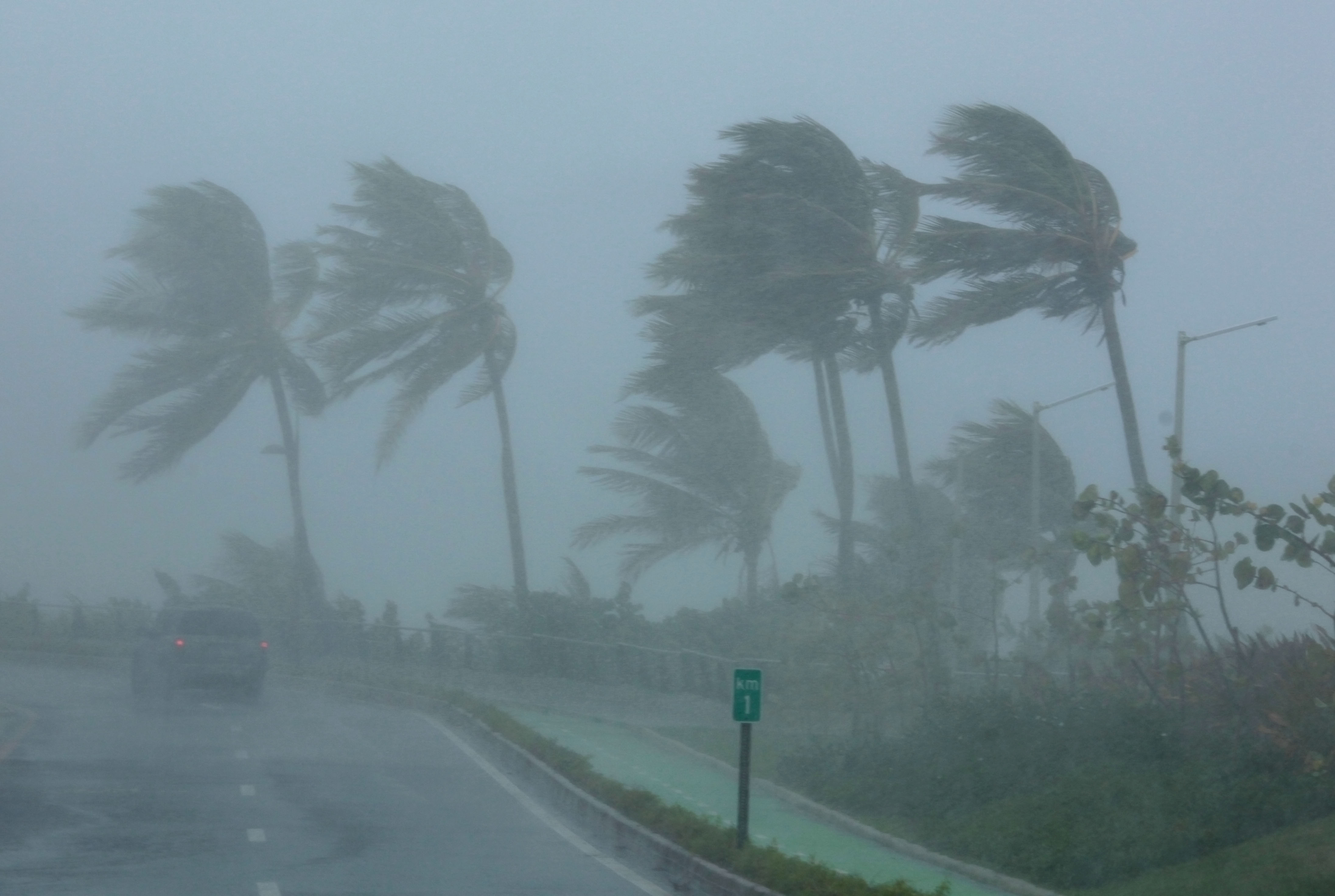SAN JUAN, Puerto Rico (Reuters) – Hurricane Irma, one of the most powerful Atlantic storms in a century, howled past Puerto Rico on Wednesday after thrashing several smaller Caribbean islands with roof-ripping winds, drenching rains and pounding surf on a collision course with Florida.
At least four people were reported killed on four different islands by Irma, which weather forecasters have described as a “potentially catastrophic” Category 5 storm, the highest U.S. classification for hurricanes.
The dual-island nation of Antigua and Barbuda was especially hard hit. The northernmost island, Barbuda, home to roughly 1,700 people, was “totally demolished,” with 90 percent of all dwellings there levelled, Prime Minister Gaston Browne said, according to island television broadcasts.
Browne said one person was confirmed killed on Barbuda. A second storm-related fatality, that of a surfer, was reported on Barbados and the French government said at least two people were killed in Caribbean island territories of St. Martin and Saint Barthelemy.
Irma, with top sustained winds of 185 miles per hour (300 km/h), was on track to reach Florida on Saturday or Sunday, becoming the second major hurricane to hit the U.S. mainland in as many weeks.
While Irma’s intensity could fluctuate, and its precise course remained uncertain, the storm was expected to remain at least a Category 4 before arriving in Florida.
Two other hurricanes formed on Wednesday. Katia in the Gulf of Mexico posed no threat to the United States, according to U.S. forecasters, But Hurricane Jose in the open Atlantic, about 1,000 miles (1,610 km) east of the Caribbean’s Lesser Antilles islands, could also eventually threaten the U.S. mainland.
The flurry of severe storm activity comes after Hurricane Harvey claimed about 60 lives and caused property damage estimated as high as $180 billion after pummeling the Gulf Coasts of Texas and Louisiana with torrential rains and severe flooding.
Florida emergency management officials, chastened by Harvey’s devastation, began evacuations days in advance of Irma’s arrival, ordering all tourists to leave the Florida Keys, a resort archipelago off the state’s southern tip, starting Wednesday morning. Evacuation of residents from the Keys was to begin Wednesday evening.
In Cuba, just 90 miles (145 km) south of the Keys, authorities posted a hurricane alert for the island’s central and eastern regions.
The eye of Irma was passing just north of Puerto Rico late Wednesday, buffeting the U.S. island territory’s capital, San Juan, with heavy downpours and strong winds that scattered tree limbs across roadways.
Earlier in the day, the storm passed over the northernmost Virgin Islands after crossing the half-French, half-Dutch island of St. Martin-St. Maarten, the U.S. National Hurricane Center said.
On its current path the core of Irma, which the Miami-based centre said marked the strongest hurricane ever recorded in the Atlantic Ocean and one of the five most forceful storms to hit the Atlantic basin in 82 years, was expected to scrape the northern coast of the Dominican Republic on Thursday. It was on a track that would put it near the Turks and Caicos and southeastern Bahamas by Thursday evening.
Karel van Oosterom, the Netherlands ambassador to the United Nations, said Irma had hit the Dutch islands of Saba and Sint Eustasius before overrunning St. Martin.
“First information indicates that a lot of damage has been done, but communication is still extremely difficult,” he said at a U.N. meeting.
Irma began lashing Puerto Rico with rain at mid-morning.
Governor Ricardo Rossello told residents to stay inside as the storm bore down on the island. “There is no reason to be in the street,” Rossello told a midday press conference.
Businesses throughout San Juan were closed and many buildings were covered with storm shutters. Occasional shoppers were out making final purchases of water, ice and food to prepare for what they feared could be several days without power.
AID FROM FRANCE
In Paris, the French government said it had delivered water and food to St. Martin and Saint Barthelemy, and that emergency response teams would be sent once the storm had passed.
Power was knocked out on both islands, according to prefecture officials on Guadeloupe. At least four buildings were damaged and low-lying regions had been flooded, French Interior Minister Gerard Collomb said.
The U.N. World Food Program prepared to provide emergency aid to Haiti if it was hit by Irma. The country was ravaged by a 2010 earthquake and Hurricane Matthew last year.
U.S. President Donald Trump said he and aides were monitoring Irma’s progress. “But it looks like it could be something that will be not good. Believe me, not good,” he told reporters at the White House.
Trump, whose waterfront Mar-a-Lago estate in Palm Beach, Florida, could take a direct hit from the storm, has already approved emergency declarations for Florida, Puerto Rico and the U.S. Virgin Islands, mobilizing federal disaster relief efforts.
Florida Governor Rick Scott said Irma could be more devastating than Hurricane Andrew, a Category 5 storm that struck the state in 1992 and still ranks as one of the costliest ever in the United States.
Residents of low-lying areas in densely populated Miami-Dade County were urged to move to higher ground.
“We can expect additional evacuations as this storm continues to come near our state,” Scott told a news conference in the Keys. He said 7,000 National Guard troops would report for duty on Friday, ahead of the storm’s expected arrival.
In South Carolina, Governor Henry McMaster also declared a state of emergency and urged residents to prepare for Irma’s potential landfall there.
Graphic – Storms in the North Atlantic: http://tmsnrt.rs/2gcckz5
(Additional reporting by Bernie Woodall in Ft. Lauderdale, Fla., Michelle Nichols at the United Nations, Brendan O’Brien in Milwaukee, Jeff Mason, Ian Simpson and Susan Heavey in Washington, Tom Miles in Geneva and Richard Lough in Paris; Writing by Ian Simpson; Editing by Jeffrey Benkoe and Tom Brown)
Copyright 2017 Thomson Reuters. Click for Restrictions.



